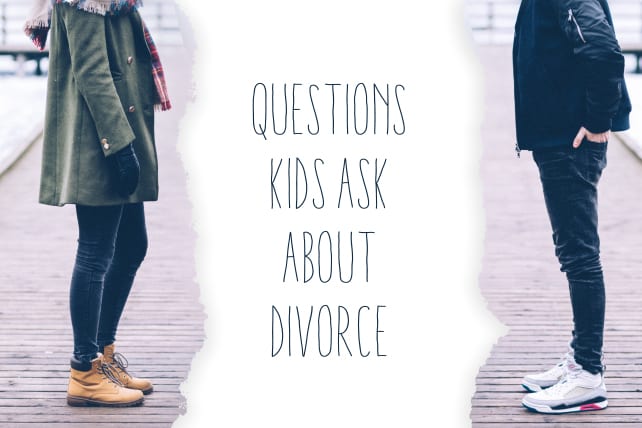I remember the first time my oldest son recognized that divorce existed. A friend in his class had two sets of parents, and my son had a lot of questions about it. I fumbled over my words trying to explain the reality of divorce while also reassuring him that his mom and me would always be married to each other. I’ll never forget what my son said next. As his little mind processed all his feelings and my attempts to reassure him that he would never have to live through a divorce, he looked at me and said, “I’ll bet his parents promised him the same thing.”
In that moment, I realized that I was not equipped to address this important issue with my own kids. To help all of us parents have these important conversations with our children, I’ve spent more time researching this important issue. I wanted to get to the root of how children are impacted by divorce (or even by the possibility of divorce).
I’m going to list these out in a different format than usual. Instead of just listing stats and facts, I’m going to list out some of the most common fears of children in their own words. These nine common questions kids ask about divorce are sobering and they reveal so much about how our children are processing this complicated issue and how we (whether we’re married or divorced) should be communicating with them to alleviate their fears.
The Seven Questions Kids Ask about Divorce are (in no particular order)…
1. Will I have to choose between my parents?
One of the biggest fears of all children is that they’ll be put in a position where they have to choose between their mom and dad. Do all you can to calm these fears and give your child the security of knowing that he/she will be in a loving home always…no matter what. Just knowing that these “what if’s” are on your child’s mind can help you be more intentional with how your communicate.
#2 might be the biggest fear kids have with divorce…
2. If my parents stop loving each other, does that mean they could stop loving me?
The most important lesson you can teach your children (whether you are married or divorced) is that your kids are loved unconditionally. Communicate this through your words and your actions. As you communicate it, try to understand how your child is wrestling with this notion of unconditional love, because our kids often base their view of love in large part by how they see their parents loving (or not loving) each other. They’ll need a lot of reassurance to know that the end of a marriage does not mean you could at some point stop loving them too. Love them. Reassure them. Repeat.
#3 reveals one of kids’ biggest fears with blended families and step siblings…
3. If my mom/dad has a new family, will another kid replace me?
Blended families can create new set of complexities for children. Parents tend to focus on the positives by explaining that the kids now get a “bonus” sibling or two Christmases instead of one. These positives can be good to highlight, but don’t miss out on the underlying fear that many children fear that these new siblings (or even a new baby with your new spouse) could somehow replace them. It goes back to #2. Reassure them of your love and the unique place they’ll ALWAYS have in your heart and in your life.
#4 isn’t talked about often, but it’s one of the biggest fears kids have when they think about divorce…
4. Will every holiday and special event from now on be a little sad?
Holidays, birthdays and special occasions are anchor points giving stability to children, and divorce threatens to shatter those moments of celebration and stability. Decide way ahead of time how you’ll keep each holiday special. Decide ahead of time that there will be NO DRAMA at these events when ex spouses are present. Make them a celebration and make sure your kids always have special celebrations to look forward to.
#5 might be the least surprising question on the list, but it’s probably an even bigger deal to kids than you realized…
5. Did I do something to cause my parents to divorce?
One of the first things parents tell their kids when they announce a divorce or separation is that, “…this is NOT your fault.” This is an important truth to communicate, and it needs to be communicated more than once. It might not be practical or healthy to tell your children all the reasons why you and your spouse are splitting up, but make sure one consistent message is that you and your spouse are and will always be unified in your love for the kids.
#6 is a fear that reveals why so many young adults are postponing marriage or avoiding it altogether…
6. Will I ever get married, and if I do, will I get divorced too?
Younger generations are postponing marriage or forgoing it altogether and it’s largely because these young adults grew up in surrounded by divorce, and they don’t want to repeat it in their own marriage. One of the greatest gifts you can give your kids is a high view of marriage. Make them excited to be married and to have a family of their own someday. Even if your own marriage ended, don’t pass on a cynical view of marriage to your kids.
Most people are surprised that even their grown children still ask question #7…
7. Will my parents get back together someday?
One of the most consistent questions kids of divorce ask is this one. Kids of all ages (even grownups) still hold out hope that their divorced parents will get back together. Keep this in mind as you communicate with your kids and as you move forward with your life. Even while you are moving forward and pursuing other relationships, your kids are still hoping and praying for your and your husband/wife to get back together.
I hope this article has given you some tools to help you have more encouraging conversations with your kids around these important issues. For more tools to help you build a stronger family, please check out my free online reading plan on the “7 Laws of Love” by clicking HERE.
If this article helped you, please share it so we can help others too!
This article originally appeared here.












